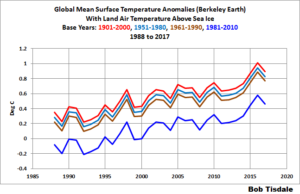by P. Homewood, Nov 4, 2022 in NotaLotofPeopleKnowThat
Temperatures in Europe have increased at more than twice the global average in the last 30 years, according to a report from the World Meteorological Organization (WMO).
The effects of this warming are already being seen, with droughts, wildfires and ice melts taking place across the continent. The European State of the Climate report, produced with the EU’s Copernicus service, warns that as the warming trend continues, exceptional heat, wildfires, floods and other climate breakdown outcomes will affect society, economies and ecosystems.
From 1991 to 2021, temperatures in Europe have warmed at an average rate of about 0.5C a decade. This has had physical results: Alpine glaciers lost 30 metres in ice thickness between 1997 and 2021, while the Greenland ice sheet has also been melting, contributing to sea level rise. In summer 2021, Greenland had its first ever recorded rainfall at its highest point, Summit station.
https://www.theguardian.com/environment/2022/nov/02/europes-climate-warming-at-twice-rate-of-global-average-says-report
…
The WMO is of course another UN organisation, so obviously cannot be trusted. Neither can any of its sources of data, such as NOAA, GISS and Berkeley Earth, which are based around homogenised data.
But what do we know about recent climate trends in Europe?
…
by P. Homewood, July 12, 2020 in NotaLotofPeopleKnowThat
https://hadleyserver.metoffice.gov.uk/wmolc/
The WMO has collated global temperature projections from twelve different organisations, covering this year and the next five years. They were produced in 2019.
…
…
It is totally clear that there is very little agreement between any of them, other than a warm Arctic.
An unkind person might call them a waste of space!
by Anthony Watts, Sep. 6, 2019 in WUWT
London, 6 September: The General-Secretary of the World Meteorological Organization (WMO) says that the alarmist narrative on climate change has gone off the rails and criticised the news media for provoking unjustified anxiety.
Speaking to Finland’s financial newspaper Talouselämä (“The Journal”) on 6 September 2019, Petteri Taalas called for cooler heads to prevail, saying that he does not accept arguments of climate alarmists that the end of the world is at hand.
Dr Taalas also spoke of the dangers of green extremism:
“While climate sceptisism has become less of an issue, now we are being challenged from the other side. Climate experts have been attacked by these people and they claim that we should be much more radical. They are doomsters and extremists; they make threats.”
And he called for the media both to challenge experts and allow a broader range of opinions to be heard.
…

by Bob Tisdale, December 3, 2018 in WUWT
Most of us are familiar with the World Meteorological Organization (WMO)-recommended 30-year period for “normals”, which are also used as base years against which anomalies are calculated. Most, but not all, climate-related data are referenced to 30-year periods. Presently the “climatological standard normals” period is 1981-2010. These “climatological standard normals” are updated every ten years after we pass another year ending in a zero. That is, the next period for “climatological standard normals” will be 1991-2020, so the shift to new “climatological standard normals” will take place in a few years.
But were you aware that the WMO also has another recommended 30-year period for “normals”, against which anomalies are calculated? It’s used for the “reference standard normals” or “reference normals”. The WMO-recommended period for “reference normals” is 1961-1990. And as many of you know, of the primary suppliers of global mean surface temperature data, the base years of 1961-1990 are only used by the UKMO.
…

…
La géologie, une science plus que passionnante … et diverse


